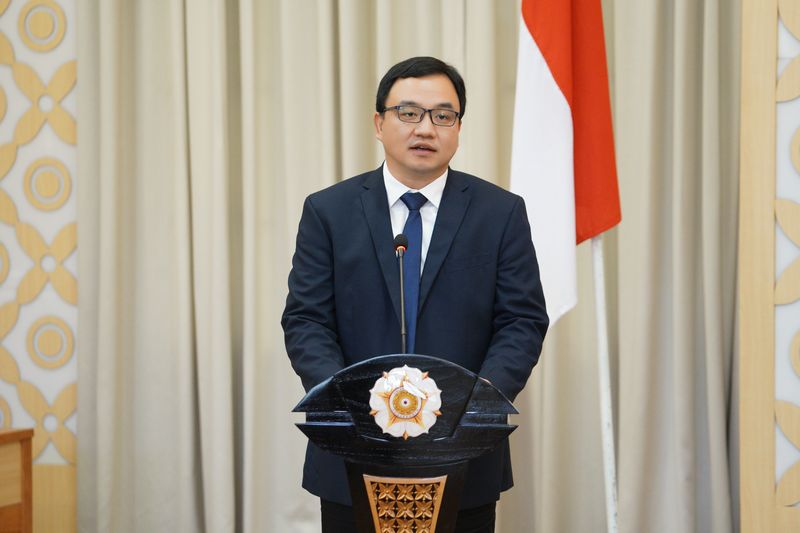
As the Director at Directorat of Partnership, Alumni and Global Initiatives of Universitas Gadjah Mada, Prof. Dr. Puji Astuti, S.Si., M.Sc., Apt. welcomed the Chinese Ambassador to Indonesia, leaders from Xiamen University, as well as faculty staff from Fisipol UGM. She mentioned that the achievements in years of bilateral cooperation has strengthened Indonesia’s relationship with China in the aspect of trade, culture, and national development. “Today, we will continue to strengthen our commitment to strategic cooperation, especially in the field of infrastructure, information, and technology. We will open communication mainly to balance it with our national interests,” She added.
In line with that spirit, the Chinese Ambassador to Indonesia, Mr Wang Lutong, felt honored to be a part of Indonesia’s friendship with China. According to him, the world is in the middle of facing new challenges that can possibly change the future. Global South countries must then cooperate and coordinate in order to face this issue, while also maintaining security as well as just global policies. “China and Indonesia are two big nations, and our 75 years of bilateral diplomatic relations has become a model for other countries to follow,” He said.

Mr Wang also added an initiative of global development that is based on security and solidarity. In this case, Indonesia and China have their own strengths as the two countries that have maintained steady bilateral relations for more than half of a century. With that in mind, these forums of communications can be an important instrument in discussing the next strategic steps that should be taken for both Indonesia and China in facing the political, economic, and industrial dynamics.
In the context of higher education, Fisipol UGM and Xiamen University have agreed to pursue collaborative ties in order to attain richer forms of education, a more diverse research area, as well as further opportunities for widening the international networks for students. Prof. Dr. Gao Yanjie, as a representative from Xiamen University, said that countries in the Southeast Asia region, particularly Indonesia, have a big potential in research. Such natural riches and cultures possessed by Indonesia have not yet been explored by other countries. Therefore, this initiative to build cooperation between universities is hoped to motivate academicians to pursue impactful research. It is then manifested through Xiamen University’s collaboration with Universitas Gadjah Mada, as well as Universitas Indonesia.

It simply cannot be ignored that Indonesia is one of China’s strongest partners, especially in international trade. Years of cooperation have had lasting positive impacts on Indonesia’s economic growth and development. Therefore, the bilateral relationship between Indonesia and China cannot be seen as only trading partners. There are potentials waiting to be utilized, and it needs to be further discussed if we want to see how far China plays a collaborative role in Indonesia’s rise internationally.
As the Director of IIS UGM, Dr. Luqmanul Hakim mentioned that this collaboration will give birth to strings of cooperation involving individuals, academicians, as well as industries. Opportunities for Indonesian students to study in China will also be much more open, and vice versa. “We need to reflect upon 75 years of cooperation. A solution must be found, not just for Indonesia and China, but for the whole world,” He explained.
The Go-South forum presented many experts from different universities. In the first panel titled “Social Economic Dimensions of China-Indonesia Relations: Prospect and Retrospect,” speakers in said panel include Dr. Miao Zhang and Xuemeng Sui (Xiamen University), Prof. Dr. Nur Rachmat Yuliantoro (Universitas Gadjah Mada), and Dr. Yeremia Lalisang (Universitas Indonesia). This panel talks about how the potential economic and social relations can be mapped through a reflection of the dynamics of bilateral relations between two countries. The second panel, which is titled “Geopolitics and Security Relations: China and Indonesia in An Age of Uncertainty,” brought Dr. Ke Xu and Dr. Shuqi Wang (Xiamen University), Dr. Klaus Radityo (Sekolah Tinggi Filsafat Driyarkara), and Andrew W. Mantong (Center of Strategic and International Studies) as the speakers.
At the same time, Go South also became part of the series of events in the Dies Natalies of Fisipol UGM, which strengthened the faculty’s commitment to always contribute towards national and global issues. Through this forum, it is hoped that it can produce collaborative and innovative initiatives that can solve global challenges.
